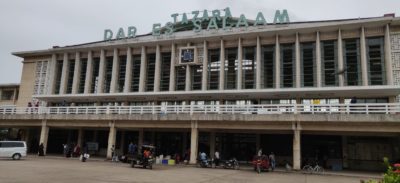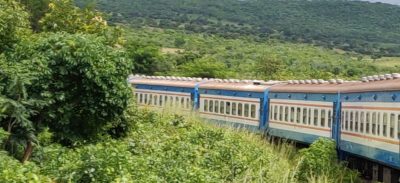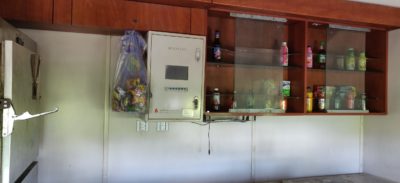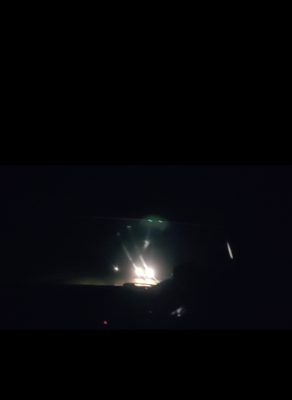by Bill Murray

We left last month’s column worried about getting tickets on a train across a swath of Africa’s midsection, from Dar es Salaam, Tanzania to Lusaka, Zambia. There’s a funny system for getting on that train. You can reserve tickets over the phone but you can’t buy them online.
You must come to the train station in person, Tanzanian Shillings in hand, and buy your tickets with cash. When we turned up the day before departure, the whole, massive, foreboding station was deserted except for a sprinkle of porters loitering outside for lack of business, and one man behind the ticket window.
We offered our $188 in cash in shillings. He offered a big smile, the fact that he had a son in Missouri, and four tickets, so that the two of us, my wife Mirja and I, claimed an entire four person compartment for our own.
There is a cliché about Africa, about the need to build in extra time for everything. It’s a cutesy, knowing, slightly smug expression of superiority among tourists when they learn it and use it for the first time; it is, in fairness, also true.
Welcome to the Tazara (TA for Tanzania, ZA for Zambia and RA for railroad) railroad. Its timetable led us to expect a forty two hour ride, but we stayed on that train for fifty seven hours and forty minutes, busting through a scheduled Sunday morning arrival time and instead arriving after midnight the next day.
Not that you’d have thought so at the start. Remarkably, even a touch triumphantly, the Tazara pulled out of Dar es Salaam station three minutes late at 3:53 on Friday afternoon. It didn’t take long for its true character to emerge, though; the Tazara was three hours late by its second stop.

Throughout the trip the tops of houses would pop up from behind plots of cultivated land. It was maize, mostly, a sunflower here or there, with paths through the fields walled off by fences fashioned from saplings bound together.
The sunflowers insinuated themselves into the maize fields little by little and eventually became fields of their own. Native bamboo asserted itself now and then through the brush. At muddy tracks, kids on bicycles came down to wave at the train.
We’d been excited about the chance to view wildlife as we progressed away from the coast, across the savannah and then up into the hillier parts of southern Tanzania. Andrew, the young guy in charge of our carriage, said sometimes he’d seen elephants, zebras and buffalo.
What we found in our compartment wasn’t going to make that easy. The window was split in half; the top half dropped down for fresh air but stayed opaque from condensation between the double panes. The bottom glass had been shattered and rather than bust out the shards to replace it, they put new glass inside over the old so that the bottom panel was mostly opaque.
By the afternoon of the third day of our 42 hour trip, I lay in my bunk and studied the clouds for a very, very long time. I thought about how it must be, living in Zambia.
I got to thinking, if I were one of the men on bicycles the train passed at crossings, after the train went by I’d stand up on my pedal, which was just a metal bar really, and push down hard. My slack-chain bike would catch and grind out onto orange mud, and I’d have to pedal with all my strength because of all the ruts, and because behind me sat my sixteen year old country-girl wife, our baby strapped across her back.
Or if I were my country-girl wife I’d be squatting, sun blazing, already sweating through my sarong at seven in the morning side-by-side with my neighbor wives, panga-hacking into the brush to make way for a few more stalks of maize. Today’s goal, every day’s goal, to advance the bare ground another meter or two.
I thought about being in jail. I’m not proud to say I had low confidence I would hold out for long against my jailer. I imagined submission would come pretty much straightaway, just like on this train, where I’d already resigned myself that they had complete control. They could publish whatever timetable they liked, with no bearing on how long it took to arrive.
There was nothing I could do to change it. If the stress of interminable delay gives a glimpse into character, I can say the Tazara railroad showed to me that I am no budding Vladimir Kara-Murza.
No doubt, the sun drenched Tanzanian town of Mbeya was the most beautiful place along the entire line. It fairly gleamed in the sun, climbing the sides of a lovely valley in an agreeable low-rise amble. They call it the Scotland of Africa.
It’s unlikely I’ll ever be back, but Mbeya looks like a worthy place to spend time. A gold mining settlement in the 1920s, it grew into the regional hub for southwest Tanzania and neighboring parts of Malawi, Zambia and Congo with universities, hospitals, banks and a few multinational businesses.
There are wildlife reserves up in the mountains, which are home to Colobus monkeys and the minde, Swahili for a small, secretive, rare and endangered antelope with the English name Abbot’s Duiker.
I can testify it’s not easy to get to Mbeya by train, and the only scheduled flights are via Air Tanzania back to Dar es Salaam. Once you’re there though, it looks like there are a few agreeable hotels including the Hill View offering rooms from a nice, comfortable sixty dollars.
Mbeya is a gateway to Lake Malawi, no more than fifty miles from its northern end, and Lake Malawi is a great adventure destination in its own right. I’ve spent a couple of nights on the lake steamer MV Ilala, and I promise to write about it here in the future.
(On Lake Malawi, lake flies swarm to form clouds in concentrations so dense, stories tell of fishermen suffocating in their canoes after being caught up in them. People eat lake flies. They swoop baskets through the swarms to catch them, then eat them pressed into cakes and fried.)
•
It took a long, long time to travel from Mbeya just a hundred more kilometers to the border town of Tunduma, such that while Mbeya bathed in sunlight, midnight came and went at the border. Still, just to experience the immigration process, that’s the stuff that makes the whole trip worthwhile.
Tunduma station’s concrete platform only extended so far from the station building, and not so far as our carriage. To hike to the station building required gentlemen and ladies alike to sort of dangle from the step below the carriage door, drop onto the ground and then walk through the weeds.
This presented more of a challenge at night because the Tunduma border station was unlit. A few high floodlights pointed down onto the platform, that’s true, but the platform was some distance away. Andrew, the carriage attendant, escorted everybody from his carriage down to the station.
Our border-crossing posse was small, just Andrew, Mirja and me and a bigger lady, who accepted help climbing off and back onto the train. We picked our way down the path until we came to the platform’s slab and then walked further along in the darkness until a clot of silhouetted shapes asked, “departing?”
I think normally the correct reply to shadowy figures loitering around a border in the dark would be “who the hell are you!?” In this case though, Andrew knew and introduced us to these men, who were the border officials.
We were departing, that was true, so the man who spoke said follow me, and took us into an open, unlit room, probably a waiting room during the day, to do our departure paperwork. This was a big, airy space with open windows. Not at all confining. Just dark.
A couple of other officials stood inside around a small table, where there was one pen among the seven of us. It belonged to one of the officials, who let us borrow it but kept a close eye on it, since it was important that he shouldn’t lose the border post’s pen.
The only light filtered in from the floodlit platform and the departure cards were very small, but I had my flashlight and one of the officials had one too. I did Mirja’s and my forms, the bigger lady borrowed the station’s pen, I aimed the light on her card, and in due course all our information was recorded with goodwill and broad smiles.
Two men came up behind from somewhere else, so the officials bid us a good trip and turned their attention to them, and we picked our way back through the weeds, along the track, in the dark. Ladies and gentlemen, the southern Tanzanian border, apparently without electricity, 2023.
On the far side of the border and an hour before dawn, the Tazara stopped and there commenced an unholy banging of cars together. Violent lurching, as if they’d push a rail car in the direction of the train until it gained as much speed as they dared allow it, and then they’d let it go.
You’d hear the clatter approach down the tracks and WHAM, you’d jump a foot out of bed and the length of the train would shudder. This, just many, many times.
I inspected that end of the train early the next morning to figure out what in the world that was all about. It was the determined addition of a bar car. Give them this: they sure did keep at it until they got it right.
 The bar car looked like the existing restaurant car, five tables down each side. Instead of a kitchen, four refrigerator boxes stood on the floor beside a wall unit, with a counter in front of them. A shelf on the back wall displayed items vended. It took until late afternoon for the refrigeration to show signs of life.
The bar car looked like the existing restaurant car, five tables down each side. Instead of a kitchen, four refrigerator boxes stood on the floor beside a wall unit, with a counter in front of them. A shelf on the back wall displayed items vended. It took until late afternoon for the refrigeration to show signs of life.
The Tazara presented a series of small disappointments like this. First the opaque compartment window. Then the bar car with no refrigeration. And just about the entire trip, the sit down toilet on the far end of our carriage remained locked.
On the third day I managed a triumph of personal hygiene. I successfully changed my socks and underwear by breaking into the sit down toilet. (I had got hold of a skeleton key.) The way we sized it up, attendants from a few carriages were keeping that toilet for themselves.
If you sat on the closed toilet top and were deft enough, you could finagle yourself out of your shoes, replace your socks, and then one leg at a time, your underpants without touching the floor which, unlike the other toilet, stayed mostly dry. What helped a lot for this maneuver was, you had all day.
•••••

It is the end of the line, it is past midnight the day after scheduled arrival, and the train ride is finished. Since the rail line was built to get Zambia’s prime export to market, it runs to Zambia’s copper belt and no further. The end of the line is the town of Kapiri Mposhi. This leaves a two hundred kilometer gap to the capital, Lusaka.
Negotiating that gap looked easy peasy from back home, in our minds. The triumphant little Tazara train chugs gaily into a sun dappled Sunday morning, optimistic and full of promise, while the stationmaster sweeps banana leaves off the platform, family members turned out in their Sunday best to greet their loved ones.
Beaten down at half past midnight, things look a little more uncertain. Exit through a gate onto the other side of the platform lit mostly by headlights. Beyond the headlights, undefined darkness in the middle of the night in the middle of Zambia.
There is no queue of gleaming 4x4s welcoming us and our VISA cards onward to Lusaka, hot towels and polite inquiries about our journey extended. There are a few minibuses out there though, and a rabble of assorted sedans sort of fading into the darkness behind them.
You don’t begin negotiations around here; they surround you. A man named Oswald offers himself and his Toyota Corolla. It’s parked in the dark back up there somewhere, and he assures us there is no question we can trust him.
Here we stand in the dark, trying to evaluate the character of this slight man of indeterminate age, silhouetted in the sharp glare of high beams. We don’t want to do this. We want nothing but to stop in the fresh air and gulp it down whole, to be still and breathe and savor freedom from the train and personal space, just to stand uncloistered in the night.
The prospect of piling out of the train and climbing right back in beside new strangers holds all the appeal of being strapped to an ankle monitor. Only thing is, we’re pretty sure we ought not lose our chance for a ride and be left on the concrete in the dark. Must act now.
Is Oswald trustworthy or not? I opt to play the hard bargainer, at least for my opening gambit. I’m the only one around here with a flashlight. We walk up to find his Corolla. I shine the light all over it. I have him open the doors. It looks a little battered inside. I have him turn on the engine. It starts.
Oswald shows us a photo ID that he says proves he’s trustworthy. I shine the mighty flashlight on some paperwork that he assures us shows he works for the railroad. Civil engineering, he says.
The minibus drivers come recruiting and play the pity card against little Oswald. “Old car mister, come with us, nice new minibus.” Oswald counters that minibuses can’t even leave here until ‘“zero five.” They can’t drive between 10:00 pm and 5:00 am because too many road accidents have led to too many deaths and a driving ban, he says.
“No! No sir, that is crazy sir, we are leaving now!” says a minibus driver. This drives Oswald crazy. “He is lying!” Oswald shouts.
If the minibuses really have to wait a few hours more, we could (at least in theory) be in a hotel in Lusaka before they even leave here. The idea of sitting here until then drives me crazy.
Oswald wants a hundred bucks. Blind shot, we go with Oswald.
Oh, Oswald is grateful, mightily. With all the glee of the pit crew guy who shakes the champagne bottle after a NASCAR victory, he piles our things into the Corolla and we’re off, the minibus drivers still crawling the platform, recruiting.
We are grateful to be off the train, in a place where you can roll your window down (which is not cracked or fogged) and breathe the night air. We are still mentally rocking and swaying a little from the train ride, and whatever happens, now our lot is with Oswald. It’s just that forty-five minutes later, we are still in Kapiri Mposhi.
We stop for gas. A passenger to Lusaka, we now understand, is also a ticket to a full tank of gas. Here is a big, brightly lit station, deserted but for a woman standing alone in the lot.
Oswald doesn’t pull up to the pump; he stops some distance from both the pump and the woman, which are not standing together. He throws open the door, strides across the lot, negotiates, comes back, jumps in and drives off, no gas. We are puzzled.
Next station, same process, except that here, Oswald pumps himself a little gas and then sets out for a third station. We begin to understand that Oswald doesn’t have any money. He’s wheedling for what gas he can get on credit, one station at a time. The first lady told him, nothing doing. The next lady, also standing alone in her lot in the middle of the night, gave him a little credit.
Station three. We are going to do it again. Oswald enters negotiations and I pile out and give him fifteen bucks in the local money I bought at a bad rate from a man I couldn’t see at that dark border for some inane contingency like this. Now Oswald is into us for a hundred bucks plus 300 Kwacha for a tank of gas, we get out onto the highway to Lusaka, and all of us are happy with that arrangement.
